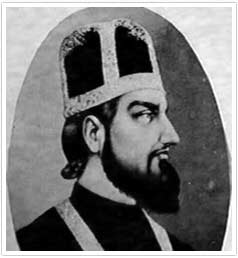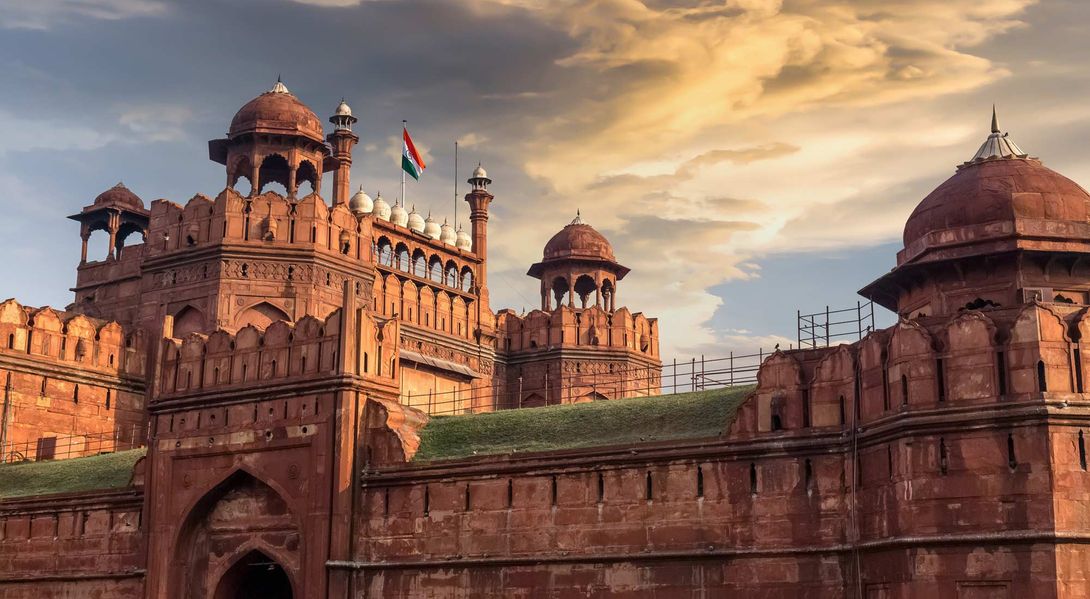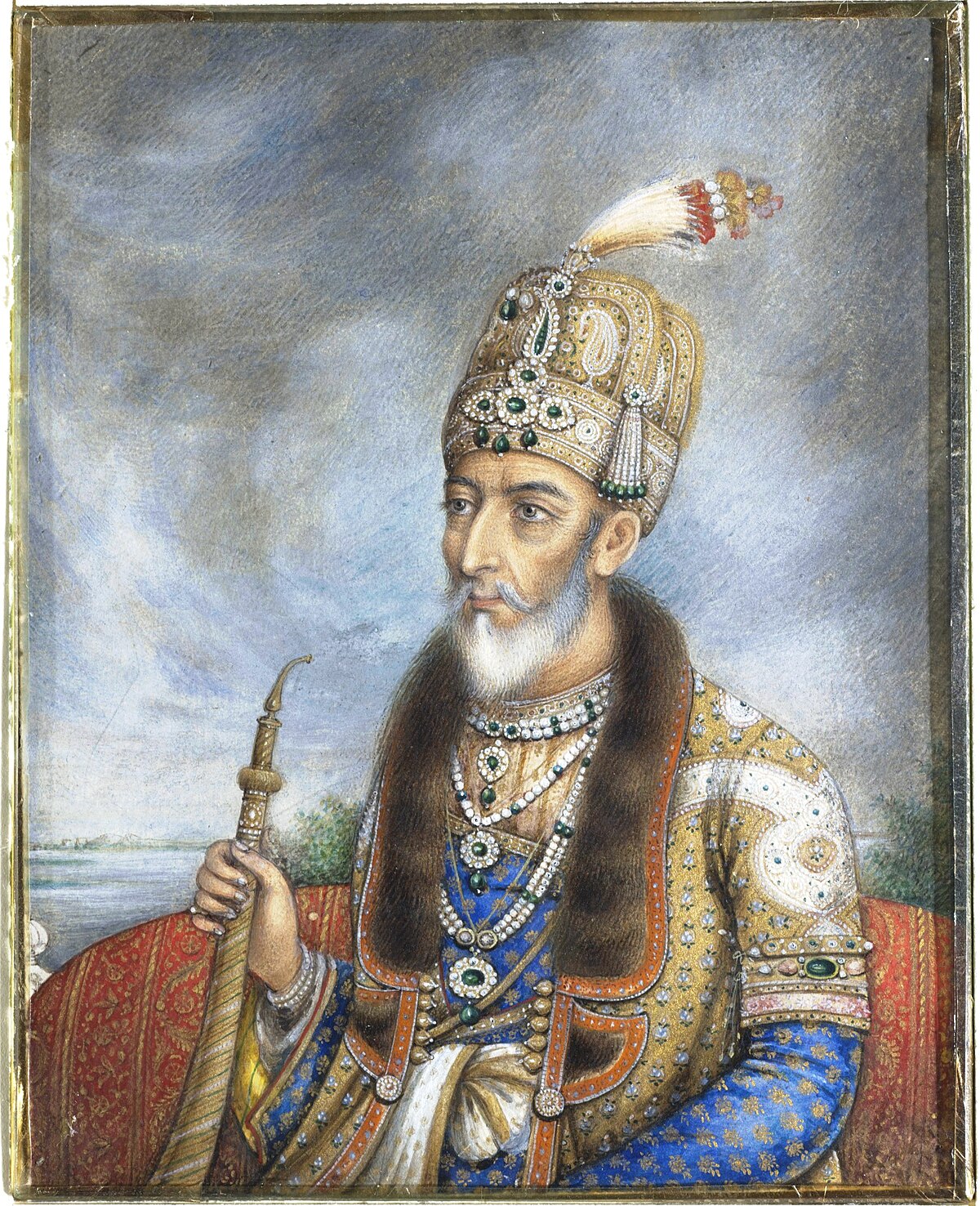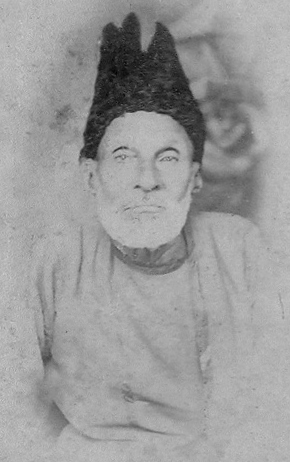رہتا سخن سے نام قیامت تلک ہے ذوقؔ
اولاد سے رہے یہی دو پشت چار پشت
Rehta sukhan se naam qayaamat talak hai Zauq
Aulaad se rahe yahi do pusht chaar pusht(Poetry makes your name known till eternity, O Zauq
Children make it known only for a generation or two.)1~ Muhammad Ibrahim Zauq
Poetry has long been regarded as the lifeblood of language. Such was also the case in 19th century Delhi, where everyone, from the Mughal king, right to the most common man, was enchanted by the charms of poetry. The power of Mughal kingship was, of course, on the verge of complete collapse, and the king remained but a nominal head. Their rule did not extend beyond the Qila-e-Moalla or the Red Fort, as it was called back then. However, this time period in the history of Delhi saw the some of the most famous Urdu and Persian poets. Some poets would not live to see the appreciation of their poetry in their own lifetime. However, this was not true for Shaikh Muhammad Ibrahim Zauq.

EARLY LIFE:
Muhammad Ibrahim Zauq was born in Delhi in the late 18th century into a Punjabi Khatri family. His father, Shaikh Mohammad Ramazan, belong to the village of Shahpur in Uttar Pradesh, and had travelled to Delhi in search of employment. Zauq and his family lived in a posh neighbourhood in Kabuli Darwaaza. Zauq famously wrote about Delhi:
ان دنوں گرچہ دکن میں ہے بڑی قدر سخن
کون جائے ذوقؔ پر دلی کی گلیاں چھوڑ کر
In dinon garche Dakan mein hai bohot qadr-e-sukhan
Kaun jaaye Zauq par Dilli ki galiyaan chhor ka
(Although poetry is greatly valued in the Deccan these days Zauq,
who would trade that for the lanes of Delhi?)2
Unfortunately, this neighbourhood was demolished after 1857 and this area was acquired to build the Old Delhi Railway Station.
At a young age, Zauq started attending a school the school run by Hafiz Ghulam Rasool, who was a respected and known educator of the time. Hafiz Rasool was passionate about Urdu poetry and wrote poetry under the takhallus (penname) “Shauq”. Under his mentorship, Zauq started his own writing journey. His own takhallus “Zauq” (meaning taste or having a liking for something) might have been inspired by that of his first mentor, Hafiz Ghulam Rasool Shauq.
ZAUQ AND BAHADUR SHAH ZAFAR:

Despite the ever-waning power of the Mughal Empire, Qila-e-Moalla frequently hosted a large number of poets, writers and artists. A lot of accomplished poets are associated with the Mughal court of the time, including Hakim Sanaullah Khan Firaq, Burhanuddin Khan Zaar, Mir Ghalib Ali Syed, Hafiz Abdul Rehman Khan Ahsaan, Mian Shakeba, Hakim Qudratullah Qasim, Mir Izattulah Ishq, Mirza Azeem Beg. Mir Qamaruddin Minnat, and Mir Nizamuddin Mamnoon. An invite to the royal mushaira and the opportunity to recite one’s poetry in the Qila was a matter of privilege and prestige for poets. Naturally, Zauq also wished to be associated with the Qila. Luckily for him, his friend Beqaraar worked for the royal family and was one of the personal staffs of the then heir apparent (Wali-ahad), Bahadur Shah Zafar. Beqaraar introduced him to Wali-ahad, and by 1807, Zauq recited regularly at the royal mushaira. Zafar also grew very fond of Zauq’s poetry.
Zafar was himself a poet, and wrote under the mentorship of his ustaad, Shah Naseer. Shah Naseer, however, migrated to the deccan. This led to the appointment of Zauq as the advisor for Zafar’s poetry. As emperor, Zafar appointed Zauq as the Malik-ul-Shoara (King of Poets/the Poet Laureate). This was a high-ranking position in the Qila-e-Moalla. However, this title did little to increase his monthly remunerations, which remained very meagre. Zauq also continued to lived in his small house located in the Kabuli Darwaaza. Zauq would remain the emperor’s mentor and Poet Laureate, until his death in 1854.

RIVALRY WITH GHALIB:
Even outside the Qila, Zauq had been closely associated with the city’s aristocrats and elites, and would often get invited to preside over literary gatherings. Yet, there was a lingering tension between Zauq and another eminent figure of Urdu poetry- Mirza Ghalib. Though a reputed poet even in his own time, Ghalib had very limited access of the Qila-e-Moalla. He, however, did not think of Zauq as a great poet, and both of them would try to put each other’s poetry down.
Ghalib did not look at his Urdu poetry as much of an accomplishment and instead thought of his Persian poetry as superior. He though of Urdu poetry as beneath him. Ghalib writes in lines which are said to have been addressed to Zauq
فارسی بيں تابہ بينی نقشہاے رنگ رنگ
بگزار از مجموعہ اردو کہ بے رنگ من است
(Look at my Persian; there you see the full range of my artistry
And leave aside my Urdu verse, for there is nothing of me there)3
Zauq would move around the city in a palanquin, observing royal decorum and protocol. Once Ghalib made a public sneer at him and his connection to the royal court: ‘Hua hai sheh ka musaahib phirey hai itraata.’ (‘Having become the King’s companion, he struts around, puffed up.’). This irritated Zauq’s admirers, would made a complaint to the king about this and the king asked Ghalib to verify if this was true. In response, Ghalib asserted that this was a couplet in his latest Ghazal. When asked to recite the verse he obliged, and the matter was resolved:
Hua hai sheh ka musaahib phirey hai itraata
Wagar na sheher mein Ghalib ki aabroo kya hai(Having become the King’s companion, he struts around, puffed up
Otherwise, what reputation does Ghalib command in the city?)4

On another occasion, Ghalib was asked to write a Sehra (wedding poem) for Bahadur Shah Zafar’s son. Again, Ghalib obliged. However the Maqta (final couplet) of this Ghazal went:
Hum sukhan-fehem hain,Ghalib ke tarafdaar nahin
Dekhein is sehre se keh de koi behtar sehra(We appreciate good poetry, we’re not partial to Ghalib
Let’s see if someone can compose a better sehra than this.)5
Zafar thought that this was another sneer on Zauq. He asked Zauq to compose a sehra in reply to the one Ghalib wrote. Zauq responded:
Jisko daawa ho sukhan ka ye suna do usko
Dekh is tarah se kehte hain sukhanwar sehra(He, who stakes claim over good poetry, go tell him
This is how good poets write a sehra.)6
Realising that his Maqta had managed to offend the emperor and his ustaad, Ghalib penned an apology:
Kya kam hai ye sharaf ke Zafar ka ghulaam hoon
Maana ke jaah-o-mansab-o-sarwat nahin mujheUstaad-e-Sheh se ho mujhe purkhaash ka khayal
Ye taab ye majaal ye taaqat nahin mujheMaqte mein aa padi hai sukhan-gustaraana baat
Maqsood us se qata-e-mohabbat nahin mujhe
(Is it not a singular honour that I am a slave of Zafar?
Agreed, I don’t have position, rank or power.To think of quarrelling with the royal ustaad
Such nerve, such audacity, such strength I don’t possess.An impudent thought has crept into the maqta
But disrespect was not my intention in any way.)7
Nevertheless, Ghalib harboured no ill-will toward Zauq. He was only driven by a competitive spirit, but also acknowledged the merit of his rival. Once, his friend recited a verse of Zauq’s:
اب تو گھبرا کے یہ کہتے ہیں کہ مر جائیں گے
مر کے بھی چین نہ پایا تو کدھر جائیں گے
ab to ghabrā ke ye kahte haiñ ki mar jā.eñge
mar ke bhī chain na paayā to kidhar jā.eñgeTired of all this, we look to death for our release
But what if even after death we find no peace?
Ghalib was very fond of this verse and spoke of it frequently in his letters.
STYLE OF WRITING:
Zauq’s poetry is known for his distinctive and precise nature. He wrote within the already established conventions and forms of Ghazal writing, and avoided deviating from these norms. He was not very experimental in his poetry writing. A characteristic feature of his poetry is its used of colloquialism and everyday Urdu idioms. In In Kulliyaat-e-Zauq his couplets feature idioms, phrases and figures of speech used in Hindustani by the common people of Delhi. He is known for what is known as the “pure ghazal” (Khaalis Taghazzul ki Shayari), which is a highly romantic form of poetry. He admired the celebrated poet Mir Taqi Mir, and wrote:
نہ ہوا پر نہ ہوا میرؔ کا انداز نصیب
ذوقؔ یاروں نے بہت زور غزل میں مارا
Na hua, par na hua Mir ka andaaz naseeb Zauq,
yaaron ne bohot zor ghazal mein maara
(They couldn’t, they just couldn’t earn Mir’s style Zauq,
the fellows worked hard on their poetry.)8
In what is, perhaps, his most well-known and widely-read ghazal, Zauq writes about the inevitability of life and its essentially unavoidable facets. He writes:
لائی حیات آئے قضا لے چلی چلے
اپنی خوشی نہ آئے نہ اپنی خوشی چلے
بہتر تو ہے یہی کہ نہ دنیا
سے دل لگے
پر کیا کریں جو کام نہ بے دل لگی چلے
Laayi hayaat aaye, qaza le chali, chaley
Apni khushi na aaye, na apni khushi chaley
Behtar to hai yahi ki na duniya se dil lagey
Par kya karein jo kaam na be-dillagi chaley
(Life brought me in, death takes me away
Neither did I come on my own, nor am I leaving at my will.
It’s best not to get attached to this world
But what does one do, some things just don’t get done without getting attached)9
CONCLUSION:

Though not as extraordinary as the other celebrated figures of Urdu poetry, he garnered considerable merit as a poet, the ustaad of the Emperor, and an eminent figure of the Qila-e Moalla during his lifetime. Despite his fame, today, he is known primarily through his rivalry with Ghalib. Sources regarding his life remain very little compared to mounting work on his literary rival. In popular culture, like the television series Mirza Ghalib directed by Gulzar, Zauq is only known because of his relation with Ghalib
Zauq died in 1854, three years before the rebellion of 1857. He gained considerable fame and renown during his life as the royal Poet Laureate. But today, his unmarked grave sits in an unnoticed corner of Paharganj’s furniture market. In his poem, “A House Divided”, R Parthasarathy writes:
“……. Listen, Zauq, after you who is left to speak of Delhi?”
TRANSLATIONS:
The source of respective translations is listed below
- 1.Beloved Delhi: A Mughal City and Her Greatest Poets. Speaking Tiger Publishing, 2018.
- 2.Ibid.
- 3.(Islam & Russell 1994, 82)
- 4.Beloved Delhi: A Mughal City and Her Greatest Poets. Speaking Tiger Publishing, 2018.
- 5.Ibid.
- 6.Ibid.
- 7.Ibid.
- 8.Ibid.
- 9.Ibid.
REFERNCES:
- Beloved Delhi: A Mughal City and Her Greatest Poets. Speaking Tiger Publishing, 2018.
- https://www.rekhta.org/poets/shaikh-ibrahim-zauq/all
- https://www.rekhta.org/poets/shaikh-ibrahim-zauq/profile
- WIG, N. N. “A NEW EVALUATION OF GHALIB AND HIS POETRY.” Indian Literature, vol. 11, no. 1, 1968, pp. 36–48.
- Mirza Asadullah Khan Ghalib. Ghalib, 1797-1869: Life and letters. Edited by Ralph Russell and Khurshidul Islam, Harvard UP, 1969.
- Parthasarathy, R. “A House Divided.” Indian Literature, vol. 47, no. 5 (217), 2003, pp. 32–34.



